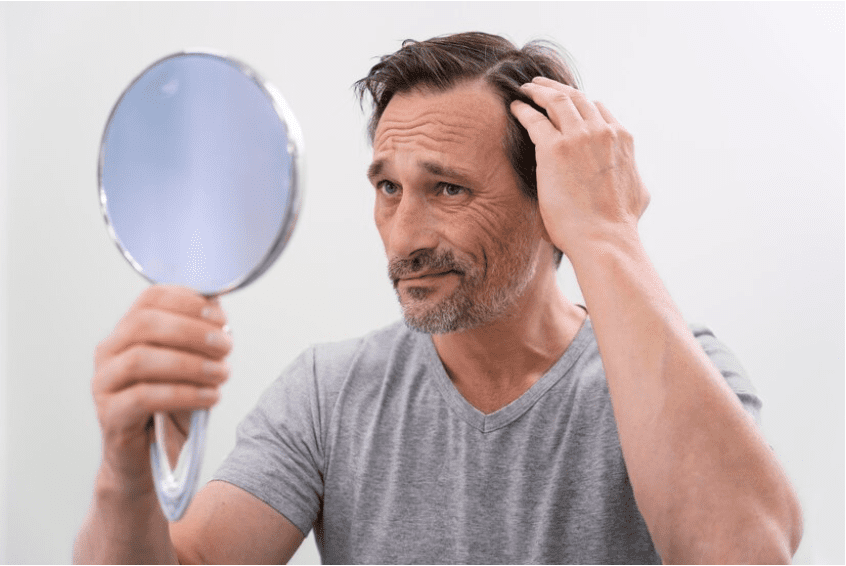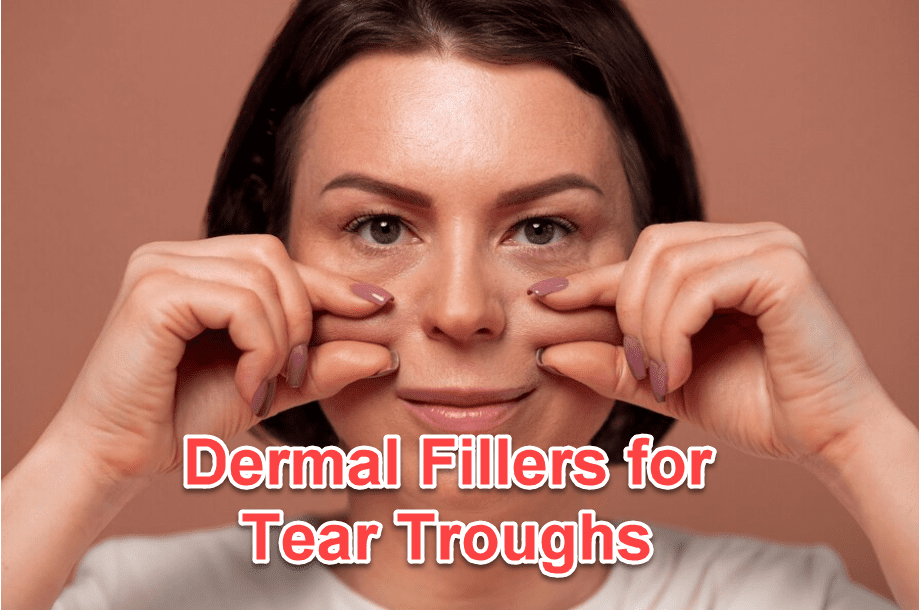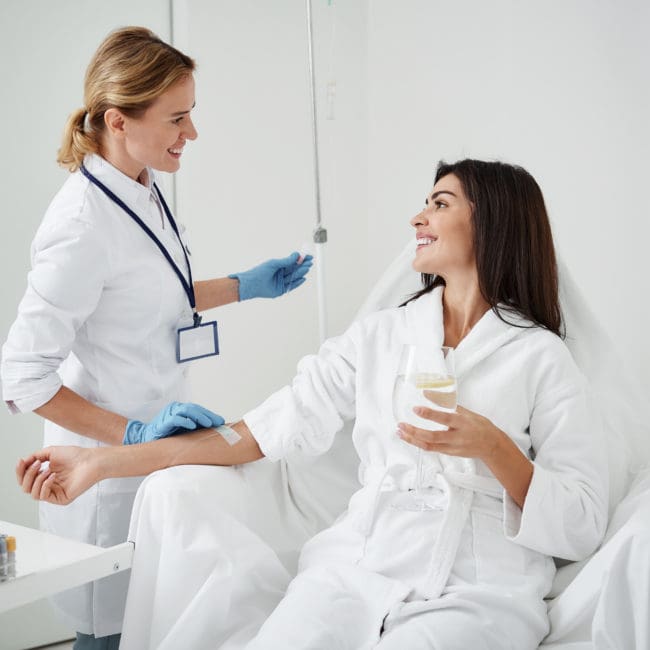

The question “Does low testosterone cause hair loss?” is increasingly common – and it’s an important one to understand. While intuition may say that low testosterone would reduce factors like hair growth, the actual relationship is more complex.
The hormonal interplay between testosterone, the hormone Dihydrotestosterone (DHT), estrogen, and more means hair thinning can arise from testosterone changes in counterintuitive ways.
It is natural for men to experience a decline in testosterone levels as they age. For many men, this decline brings frustrating changes like reduced muscle mass, increased body fat, lower energy levels, and even emotional shifts.
However, one perplexing symptom that men commonly face during this decline is hair loss and thinning. This can understandably cause distress and lower self-confidence.
In this article, we’ll look at how a form of testosterone called DHT and the hormone estrogen actually affect hair follicles. We’ll see if the latest research shows a clear link between testosterone drops and balding. We’ll also clear up some common myths about hair loss.
Whether you’re dealing with thinning hair yourself, thinking about testosterone supplements, or just want to understand the natural aging process, this guide will break it down in simple language.
Read on to get the facts and finally figure out if Low T is why you’re losing hair on your head.
Testosterone and Hair Loss: The Connection
What do testosterone and your hairline have in common? More than you might think. Many men notice their hair starting to thin out or recede as they age. At the same time, testosterone levels begin to drop about 1% per year after age 30.
So, is low testosterone causing hair loss? Or could high testosterone levels be to blame? The truth is complicated because different hormones interact to affect hair follicle growth in complex ways.
Does Low Testosterone Cause Hair Loss Directly
Low testosterone does not directly cause hair loss. It is primarily caused by a combination of hormones and certain genes.
Testosterone exists in different forms in the body, and hair loss is caused by the conversion of testosterone into dihydrotestosterone (DHT). As compared to testosterone, DHT is more potent, leading to the shrinkage of hair follicles.
However, having low testosterone levels alone does not directly cause hair loss.
What Is Dihydrotestosterone (DHT) and Its Role in Hair Loss
DHT, also known as dihydrotestosterone, is the hormone responsible for hair loss. It is derived from testosterone, which is a hormone found in both men and women.
DHT can bind to specific receptors in hair follicles. This can lead to shorter and thinner hair growth cycles, causing more hair to fall out than is replaced.
It is particularly important in male pattern baldness, a common type of hair loss in men.
The underlying reason for hair loss, however, can be a number of factors, including genetics and hormones.
Can High Testosterone Levels Contribute to Hair Loss
Yes, high testosterone levels can contribute to hair loss. Here is a simplified explanation:
The hormone testosterone is converted into another hormone called dihydrotestosterone (DHT) in the body. Even though testosterone levels are high, it gets converted into DHT.
DHT actually causes the hair follicles on your head to shrink, which makes your hair thinner over time. Eventually, the follicle stops growing hair completely.
So, while the testosterone itself does not directly cause hair loss, the DHT that the testosterone is converted into does damage hair follicles.
However, it’s important to note that not everyone who has high testosterone levels will experience hair loss, as genetic factors and sensitivity of hair follicles to DHT also play a role.
In summary – high testosterone may equal higher DHT levels, resulting in thinning hair and eventual baldness, even if your testosterone is not low.
Are There Genetic Factors Involved in Hair Loss
Yes, genetic factors play a major role in hair loss. Here is a simple explanation:
Some people are just more prone to hair loss because of their genes. Male pattern baldness is very common and passed down in families.
Genetics affect things like:
- Sensitivity Levels: How easily your hair follicles miniaturize from DHT exposure.
- Hormone Levels: How much testosterone your body naturally produces and converts into DHT.
- Tissue Traits: specifics like how many receptor sites you have for hormones to bind to.
People with a genetic predisposition will likely lose their hair earlier and faster when hormones like DHT are out of balance.
The good news is gene therapy may someday help shut off the sensitivity to DHT for those prone to baldness. Treatments already exist to control DHT activity and its effects on your follicles.
While you can’t rewrite your DNA, you can influence how it expresses itself. So, don’t think of genetics as destiny when it comes to hair loss. Be proactive against DHT, and you can still keep your hair healthy.
How Does Testosterone Affect Hair Growth
Testosterone actually helps hair grow – but only in some areas. It causes thicker, faster-growing hair on parts of the body like the face, legs, chest, and arms. This is why men tend to be more hairy than women overall.
However, a byproduct of testosterone called DHT (dihydrotestosterone) does the opposite on your scalp. It damages the follicles there and causes them to shrink. This makes your head hair thin out instead of growing faster.
The reason is that hair follicles on different parts of your body have slightly different types of receptors. Receptors are like little docks that hormones can land on. Follicles on your head have receptors that interact with DHT in a way that slows growth.
So, in the end – testosterone itself promotes thick hair growth on the body, but too much testosterone can be converted to DHT. Higher DHT will attach to scalp follicles and thin out your hair.
It’s about balance – too much testosterone can tip things towards more scalp hair loss over time through excess DHT.
Does Testosterone Replacement Therapy (TRT) Lead to Hair Loss
Testosterone replacement therapy (TRT) does not directly cause hair loss. It may lead to some hair loss. But there are a few reasons why:
First, testosterone gets converted into DHT – which we know causes hair follicles on the scalp to shrink. More testosterone from replacements means more DHT production.
Second, many men who take testosterone replacements are already predisposed to male pattern baldness through genetics. The extra testosterone tips them over the edge and makes hair loss happen faster.
However, research shows that testosterone itself does not directly harm hair follicles – it’s the DHT byproduct to blame.
The good news is DHT blockers exist that can help stop the damage. Taking these with testosterone can help find a balance between the boosts of higher testosterone while protecting vulnerable hair follicles.
So, in summary – testosterone therapy does increase the risk of losing those luscious locks. However, managing DHT can help limit hair thinning, even on higher doses of testosterone. The key is balance.
Can Taking Testosterone Supplements Trigger Hair Loss
When you take testosterone supplements, it increases the overall levels of testosterone circulating in your body.
Even if the extra testosterone helps with things like energy and muscle mass, more of it inevitably gets converted into extra DHT as well.
This excess DHT then overpowers hair follicles on your head and quickens the pace of miniaturization. In other words, the follicles shrink faster and grow weaker, thinner strands that are prone to falling out.
So, in summary – yes, testosterone supplements can accelerate the development of male pattern baldness in those who are genetically susceptible. Limiting DHT is key to maintaining lush locks.
Is Balding a Sign of Low or High Testosterone Levels
Balding is not a clear sign of either high or low testosterone levels. Here’s a simple explanation:
Balding happens when testosterone gets converted into DHT (dihydrotestosterone), which damages hair follicles. So, balding depends more on your tissue’s sensitivity to DHT rather than your total T levels.
That means men with high, normal, or even low testosterone may still be bald if genetics cause their scalp tissue to be sensitive to DHT.
On the other hand, men who naturally produce less DHT or have scalp tissue resistant to it can have high testosterone yet keep a full head of hair.
In the end, hair loss depends on an interplay of factors like genetics, tissue sensitivity, conversions of T to DHT, and more. There isn’t a definite level of testosterone that guarantees you’ll go bald or keep your lush hair.
How Does Testosterone Influence Hair Loss in Males Vs. Females
Testosterone influences hair loss differently in males versus females.
In males, testosterone gets converted into DHT, which causes thinning hair on the scalp for those genetically prone to male pattern baldness.
Higher testosterone = more DHT = faster hair loss
In contrast, women have very little testosterone naturally. However, some conditions can increase testosterone and cause excess facial and body hair growth. However, this rarely impacts the hair on a woman’s scalp.
Instead, when a woman’s hair thins, it’s usually connected to menopause and estrogen levels dropping. Lower estrogen can lead to a similar balding pattern in women as DHT does in men after puberty.
So, while increased testosterone doesn’t directly cause balding in women, shifting hormones at midlife can. The key culprit is the relative loss of estrogen, not high amounts of testosterone or DHT attacking hair follicles.
In summary, hormonal impacts on hair growth differ quite a bit between the sexes – but sensitivity to changing levels as we age unites us.
What Are Other Conditions Linked to DHT and Hair Loss
Here are some other conditions linked to higher DHT and hair loss:
- Anabolic steroid abuse: Illegally using anabolic steroids to build muscle can drive up testosterone. The excess gets converted into scalp-damaging DHT.
- Adrenal or testicular tumors: Rare tumors that produce extra androgens like testosterone and DHT and accelerate male pattern hair loss.
- High insulin levels: Excess insulin can indirectly signal to tissues like the prostate and hair follicles to produce more DHT. Common with prediabetes and PCOS.
- Thyroid problems: Both high (hyperthyroidism) and low (hypothyroidism) thyroid levels influence hormone pathways that modulate DHT sensitivity at hair follicles.
Any condition that drives up active testosterone or DHT levels itself – along with underlying sensitivity due to genetics or environment – will exacerbate hair thinning. The key is identifying and addressing the imbalance early on.
Myths and Misconceptions About Low Testosterone and Hair Loss
Here are some common myths and misconceptions about low testosterone and hair loss:
Myth: Low testosterone causes baldness directly.
Fact: It’s high levels of DHT, converted from testosterone, that shrink hair follicles. Low T itself does not directly cause hair loss.
Myth: More testosterone equals a fuller head of hair.
Fact: Excess testosterone also raises DHT levels, which accelerates hair loss in the genetically prone. It’s about balance.
Myth: Men with hair loss have “too much” virility and testosterone.
Fact: Balding depends on DHT sensitivity, not sex drive. Many men with high libidos keep their hair despite high T levels.
Myth: Taking testosterone treatment will make anyone go bald.
Fact: If you are not predisposed to male pattern baldness, boosting T may not impact your hair at all. However, those prone to hair loss may see acceleration from extra DHT exposure without using DHT blockers.
The relationship between testosterone, DHT, and your hairline is complex. Knowing the facts helps make the right decisions about treatments or lifestyle changes to stall hair loss.
What Are Signs of Low Testosterone
Here are the main signs of low testosterone in men:
- Low Sex Drive: Not feeling interested in sex or being unable to get or maintain erections can indicate Low T issues.
- Low Energy: Feeling constantly fatigued, depleted motivation, and struggling through workouts points to hormone imbalance.
- Increased Body Fat: Gaining weight in the gut and chest area despite diet and exercise may reflect Low T.
- Mood Changes: Irritation, depression, lack of focus, and “brain fog” relate to testosterone influences in the brain.
- Loss of Muscle Mass: Losing strength along with thinning muscles, especially in the upper body.
- Hair Changes: Thinning body hair, including in the armpits and pubic area. Scalp hair may recede faster.
If you are experiencing multiple signs of the above, have your total and free testosterone blood levels checked. Addressing low amounts through medication or lifestyle can help you restore energy and vitality.
How Is Low Testosterone Diagnosed
Low testosterone is diagnosed through blood work. Two important tests are done, which include looking at total testosterone levels and free testosterone levels.
Total testosterone levels measure the overall amount of testosterone circulating in your body from all sources.
Free testosterone levels measure the amount of testosterone not bound to proteins, and thus “free” and usable by your cells and tissues.
If your total or free testosterone levels come back lower than the normal range expected for your age, then you are diagnosed with low testosterone or Low T.
Having both total and free testosterone on the low end can dramatically affect energy, sex drive, muscle mass, mood, and more.
Levels often decline slowly, so Low T can sneak up on men. Getting tested every five years after age 35 can help detect falling levels before hormone imbalance sets in.
FAQs and Common Concerns
Can hair loss from low testosterone grow back?
Yes, in some cases, treating low testosterone can help hair grow back. Boosting T levels counters the reduction of hair follicles caused by long-term DHT exposure. However, regrowth potential depends on factors like genetics, age, and how advanced loss is.
How do you stop hair loss caused by low testosterone?
Drugs like DHT blockers directly thwart the hormone, causing most hair follicle damage. Boosting overall testosterone moderates DHT and helps reverse miniaturization. But genetics determine sensitivity, so what works varies from person to person.
Will hair regrow after stopping testosterone treatment?
Sometimes, yes. If testosterone therapy ceases soon enough, DHT levels fall back to baseline. This takes the pressure off follicles, and hair begins growing again after a few months. But shrinking sensitivity to DHT may be permanent – it’s a case-by-case basis.
Does masturbation affect testosterone levels?
Occasional masturbation likely has little impact on T. However, excessive masturbation may lower androgen receptor availability. But most effects reverse within days after release frequency is moderated. In the end, masturbation only temporarily alters testosterone.
Wrapping Up
Testosterone plays a multifaceted role in hair loss, though research continues to illuminate the science behind it. While low testosterone itself does not directly prompt balding, it converts to DHT, which can impair hair follicles.
Excessive testosterone may generate more DHT, while deficient levels disrupt balance. Optimizing testosterone as you age is crucial.
Genetics govern scalp sensitivity to DHT, but you can mitigate genetic predispositions through lifestyle strategies – lowering stress, staying active, and eating well. Medications can help when needed. Combining treatment and healthy habits empowers you to curb DHT’s effects.
Understanding the nuances allows customized hair loss deterrence. Evaluate your distinctive traits and take control. Proper therapy helps retain your hair and looks. For specialized testosterone treatment, consult experts at Green Relief Health, who can analyze your hormone levels and create a personalized plan.






